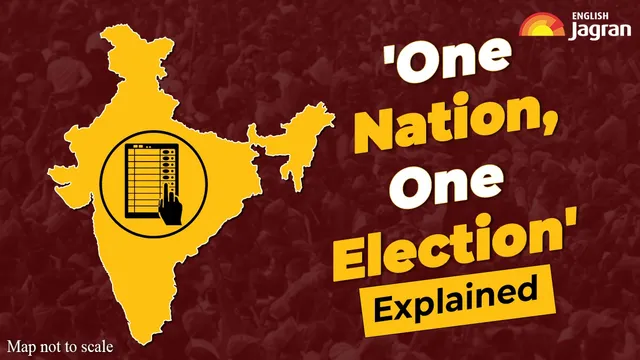- By Priyanka Koul
- Thu, 12 Dec 2024 05:41 PM (IST)
- Source:JND
One Nation, One Election' Bill Explained: The Union Cabinet has approved the 'One Nation, One Election' initiative, chaired by Prime Minister Narendra Modi, on Thursday. If the 'One Nation, One Election' Bill is tabled and passed in both Houses—the Lok Sabha and Rajya Sabha—it will mark a significant step towards simultaneous Lok Sabha and state assembly elections, which are currently conducted separately. The government is expected to introduce a comprehensive bill on the subject during the ongoing Winter Session of Parliament.
A high-level committee on simultaneous elections, chaired by Shri Ram Nath Kovind, former President of India, was constituted on 2 September 2023. The committee’s report, spanning 18,626 pages, was submitted to President Shrimati Droupadi Murmu. The report was the result of extensive consultations with stakeholders and experts and thorough research conducted over 191 days.
The committee held extensive discussions to gather the perspectives of various stakeholders. Forty-seven political parties submitted their views, of which 32 expressed support for simultaneous elections. Additionally, 80 percent of the respondents were in favour of the proposal. In September 2024, the Union Cabinet approved the 'One Nation, One Election' recommendations, proposing concurrent elections for the Lok Sabha, state assemblies, urban local bodies, and panchayats to be conducted within a 100-day timeframe.
Making a strong case for 'One Nation, One Election,' former President and committee chairperson Ram Nath Kovind stated on Wednesday that the central government "will have to build consensus" to implement the initiative. He emphasised that this proposal is "not in the interest of any party but the nation." Kovind further asserted that 'One Nation, One Election' could be a transformative measure for the country, with economists predicting it could boost GDP by 1 to 1.5 percent after implementation.
What Is the 'One Nation, One Election' Bill?
The 'One Nation, One Election' Bill is centred on holding simultaneous elections for the Lok Sabha and state assemblies across the country. Prime Minister Narendra Modi has been a long-standing advocate of this idea.
Currently, elections to state assemblies and the Lok Sabha are conducted independently, either at the end of a government’s five-year term or following its premature dissolution.
In September, the Union Cabinet approved the proposal based on the recommendations of the high-powered committee chaired by former President Ram Nath Kovind.
Key Recommendations For 'One Nation, One Election'
1. Simultaneous Elections: As a first step, elections for the Lok Sabha and state legislative assemblies will be conducted simultaneously. In the second phase, elections for municipalities and panchayats will be synchronised with the Lok Sabha and state assembly elections, to be held within 100 days of these elections.
2. Unified Electoral Roll and EPIC: The committee recommends the use of a single electoral roll and Electoral Photo Identity Cards (EPIC) across all levels of government.
3. Restoring Election Cycles: The committee observed that the loss of synchronised elections after India’s first two decades of independence has burdened the economy, governance, and society. Frequent elections disrupt governance, impose significant costs, and strain administrative resources. To restore the election cycle, the committee suggests a legally tenable mechanism for synchronisation.
4. Constitutional Amendments: To achieve synchronisation, the committee suggests that the President of India issue a notification, effective from the first sitting of the Lok Sabha after a general election. This date, termed the 'Appointed Date,' would mark the beginning of synchronised election cycles.
The tenure of state assemblies elected before the appointed date would end with the subsequent Lok Sabha elections, ensuring all future elections are held simultaneously.
Challenges in Implementing 'One Nation, One Election'
Despite its potential benefits, the project faces strong criticism. Critics believe that it risks undermining democratic values by emphasising national issues above local ones. Implementing the initiative would necessitate major constitutional revisions, including changes to Articles 83, 85(2)(b), 174(2)(b), 356, and 75(3), as well as adjustments to the Representation of the People Act of 1951.
Furthermore, obtaining the required two-thirds majority in Parliament and ratification by at least half of the states is a significant task. Logistical concerns, such as assuring the availability of electronic voting machines (EVMs), polling people, and proper security, exacerbate the process.
Benefits of Simultaneous Elections
- Cost Savings: Joint elections can significantly reduce the financial burden of conducting separate polls every year.
- Administrative Efficiency: Simultaneous elections reduce the frequent imposition of the Model Code of Conduct (MCC), which disrupts governance.
- Higher Voter Turnout: A single election cycle may encourage greater voter participation.
Holding elections at regular intervals avoids frequent disruptions to public life caused by staggered polls.

